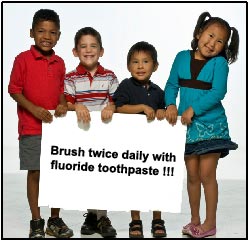Best Practices
Pregnancy
COLLABORATE!
Collaborate with the medical, community health, Early Head Start, and dental providers to assure that all pregnant women visit the dental clinic during the early months of pregnancy.
EDUCATE!
Educate the mother about the transmissibility of dental caries and ways to prevent ECC. Provide education and support to promote breastfeeding.
COUNSEL!
Provide nutrition counseling to reinforce the importance of a healthy diet during the perinatal period.
MAKE RECOMMENDATIONS!
Recommend that pregnant women stop using tobacco.
SET AN APPOINTMENT!
The dental staff can provide an oral exam, periodontal disease screening, prophylaxis, recommendations for completing any needed dental treatment, caries control, and appropriate recall.
The dental staff can assess the mother’s caries risk and prescribe anti-bacterials like chlorhexidine or xylitol for high-risk mothers during the perinatal period.
Birth - Two Years
COLLABORATE!
Collaborate with the medical, community health, and dental providers to assure that children receive the following oral health services.
ASSESS!
Provide an oral health assessment soon after the first tooth erupts or by 12 months of age. Consider caries stabilization with glass ionomer as appropriate.
PREVENT!
Provide topical fluoride varnish treatments 4 or more times during the period from 9-24 months of age.
EDUCATE FAMILIES!
Educate families about the importance of never putting baby in bed with a bottle, using a cup by 6 months, and weaning off the bottle at 12-14 months of age.
Educate families about the protective qualities of fluoride. Ideally, every child should be drinking fluoridated water and have their teeth cleaned twice daily with a small smear of fluoride toothpaste.
Teach families to lift the lip and look for chalky white or brown spots, and if they see any signs of dental decay, they should see the dentist.
ENCOURAGE!
Encourage healthy snacks and limited exposure to sweets, refined starches like chips and crackers, and sweetened drinks. Reinforce to families that pop does not belong in a preschooler's diet.
Three - Five Years
COLLABORATE!
Collaborate with the medical, community health, Head Start, and dental providers to assure that every child has a dental home.
Consider caries stabilization with glass ionomer as appropriate. Consider dental sealants for the primary molars of any children who are at high risk for dental caries.
PREVENT!
Provide topical fluoride varnish treatments 3-4 times a year for children at high risk for dental caries.
EDUCATE FAMILIES!
Educate families about the protective qualities of fluoride. Ideally, every child should be drinking fluoridated water and have their teeth brushed twice daily with a pea-sized amount of fluoride toothpaste.
Encourage healthy snacks and limited exposure to sweets, refined starches like chips and crackers, and sweetened drinks. Reinforce to families that pop does not belong in a preschooler’s diet.
HEAD START!
Daily supervised brushing with a peasized amount of fluoride toothpaste. Through Head Start, consider implementing a fluoride varnish and xylitol program for 3-5 year olds.
Other preventive measures such as chlorhexidine, iodine, and calcium phosphate products may be viable chemotherapeutics along with fluoride varnish and the other strategies outlined in the ECC Collaborative, but at this time, these measures have insufficient clinical evidence to be considered best practices. We are encouraging pilot-testing of these and other chemotherapeutics.




